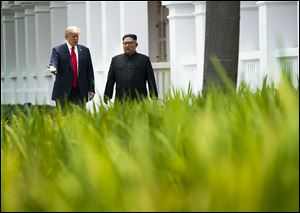
The opening to North Korea
6/12/2018
President Trump and Kim Jong Un of North Korea take a walk after their lunch on Sentosa Island in Singapore.
The summit in Singapore, between President Donald Trump and North Korea’s Kim Jong Un, will be seen by some as “historic,” and by critics as slight. It is both of those things.
The summit is best understood as an “opening,” like the Nixon opening to China, Nixon’s detente with the then USSR, and Ronald Reagan’s personal diplomacy with Mikhail Gorbachev, which began in Reykjavik, Iceland, in 1986. None of those summits produced concrete results. One went badly, at first. Rather they were openings to leaders and nations with whom the United States was either in a state of cold war or extreme isolation and alienation.
Click here to view more Blade editorials
Those were moments in time in which actors, with both imagination and ultimate pragmatism, pivoted. The moment of pivot did not, in itself, create a new reality, but an opening to an eventual new reality was made.
The new realities that followed were a result not just of hard work and diplomacy, but self-interest. Presidents Nixon and Reagan had the foresight and guts to say: Why not? Note that it took Republicans to do this, and for two reasons. They were dealing from strength and they were the ones who would have attacked Democrats for doing the very same thing. Power changed them and their personal, political histories inoculated them.
But the Russian and Chinese leaders of those moments in history knew that what they were doing was not working. Russia knew it could not sustain its military machine. The Chinese wanted to join the world economy. It has worked out rather well for them.
Mr. Reagan’s opening led to the end of the arms race, and, with deep historical forces moving coincidentally in Eastern Europe and Russia, the end of communist totalitarianism, and the Eastern Bloc. Mr. Reagan famously said, “Mr. Gorbachev, tear down this wall.” He didn’t. History itself did. But actions ignite historic change, and the action, the opening, the pivot, ignited the great and most hopeful changes of the last century.
In this case, President Trump took the initiative. He was the first president willing to meet face-to-face with Mr. Kim, and that was something the North Korean dictator wanted. Many will say that Mr. Trump’s concession was ending war games in South Korea, which of course, can be swiftly resumed. No, the real concession was the meeting itself — Mr. Kim on the world stage, standing next to the American president, as an equal.
Mr. Trump will get no credit for this from his critics and haters, but credit is deserved. His “crazy” idea paid off. Maybe it is time to stop evaluating him by the old measures. And maybe it is time for the New Cold Warriors to be intellectually honest: If it is better to talk than not talk with Cuba, it is better to talk than not talk with Russia and North Korea.
What was Mr. Kim’s concession? Nothing tangible, that is true. But a historic diplomatic opening is never about the specifics. It’s about tone. His concession was dropping his nuclear saber-rattling.
What is the ultimate end game here? It is denuclearization, on both sides, on the Korean peninsula. And, yes, Mr. Kim has promised as much before. And, no, Mr. Trump should not trust. He should verify. But, maybe, just maybe, Mr. Kim really is a rational actor. And if so, he knows, or the Chinese leaders have pointed out to him, that his people are starving and his precious nukes have won him precisely nothing — no strategic advantage and no security. Gradual denuclearization provides the latter — and a chance at South Korean or Japanese or Chinese-style prosperity.
Meanwhile, the U.S. still possesses all the carrots (like withdrawal of some 30,000 U.S. troops and more summits) and all the sticks — weapons, of all kinds, that actually work and can reach their targets.
There are no guarantees, and there will surely be setbacks in a very long process, but think of where we have been for many years: stalemate. And where we were a few months ago: at times on the threshold of war. This opening is surely an important and amazing step forward.